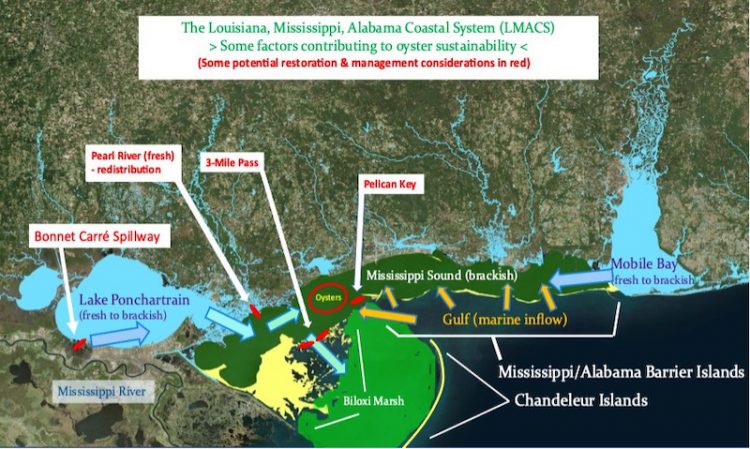Full Title: Structured-decision making to co-produce an actionable science plan in support of Louisiana, Mississippi, Alabama Coastal System Water Quality Management
Managers and scientists will collaborate on a research plan to develop a science-based tool for quantifying and reducing critical uncertainties and supporting management of the Louisiana, Mississippi, Alabama Coastal System, especially with regard to water quality and oyster habitat.

Lead Investigator & Natural Resource Manager: George Ramseur, Mississippi Department of Marine Resources, george.ramseur@dmr.ms.gov
Natural Resource Managers: Jon Hemming (U.S. Fish and Wildlife Service); Justin McDonald (U.S. Army Corps of Engineers); Jim Pahl (Louisiana Coastal Protection and Restoration Authority); Will Underwood (Alabama Department of Conservation and Natural Resources)
Project Team: Anna Linhoss (Auburn University); Soupy Dalyander and Mike Miner (The Water Institute of the Gulf); and Paul F. Mickle (Northern Gulf Institute)
Federal Program Officer/Point of Contact: Frank Parker (frank.parker@noaa.gov)
Award Amount: $126,646
Award Period: This project began in September 2021 and will end in August 2022.
Why it matters: Mississippi’s historic oyster fishery has been declining since Hurricane Katrina in 2005 and has been closed for the past two years. Resource managers have faced difficulties in deciding upon management actions because the future of the fishery is complicated by major uncertainties including chronic coastal erosion and acute freshwater inputs from Bonnet Carré Spillway releases. Effective solutions must be developed in synergy and coordination with efforts such as Louisiana’s Coastal Restoration and Protection Authority Coastal Master Plan, Alabama’s Coastal Plan, U.S. Army Corps of Engineers Mississippi Coastal Improvements Program Mobile District, and others.
What the team is doing: The project will use a facilitated structured-decision making approach to refine key objectives, the range of management alternatives, and uncertainties that complicate decision making. The project will support natural resource management decisions by setting up a transboundary framework and designing scientific tools to provide Mississippi with the capacity to engage with Louisiana and Alabama in quantifying critical uncertainties that span multiple jurisdictions of the functional Mississippi Sound estuary.
Expected outcome: The project will produce research and application plans for building a science-based tool to quantify and reduce decision-relevant critical uncertainties related to management of the Louisiana, Mississippi, Alabama Coastal System. A research plan will be co-developed to reduce critical uncertainties on water quality and oyster habitat in the LMACS. An application plan will be developed to transition that research into practical application by the Mississippi Department of Marine Resources and other decision makers.
 Official websites use.gov
A .gov website belongs to an official government organization in the United States.
Official websites use.gov
A .gov website belongs to an official government organization in the United States.
 Secure .gov websites use HTTPS
A lock or https:// means you’ve safely connected to the .gov website. Share sensitive information only on official, secure websites.
Secure .gov websites use HTTPS
A lock or https:// means you’ve safely connected to the .gov website. Share sensitive information only on official, secure websites.